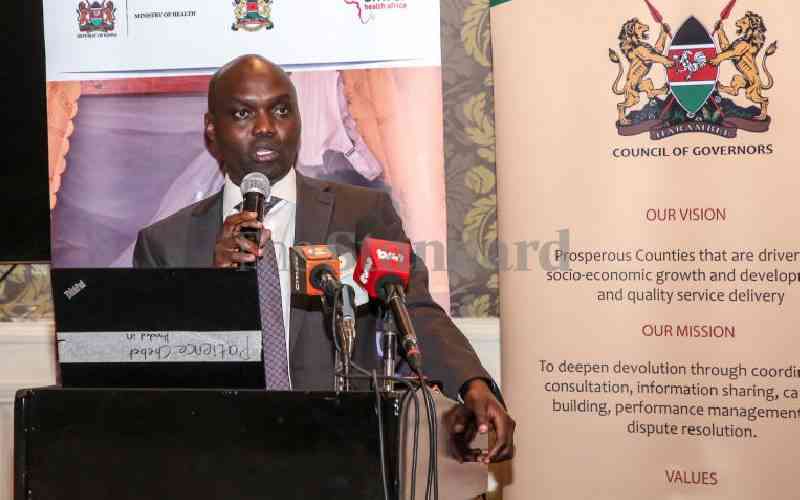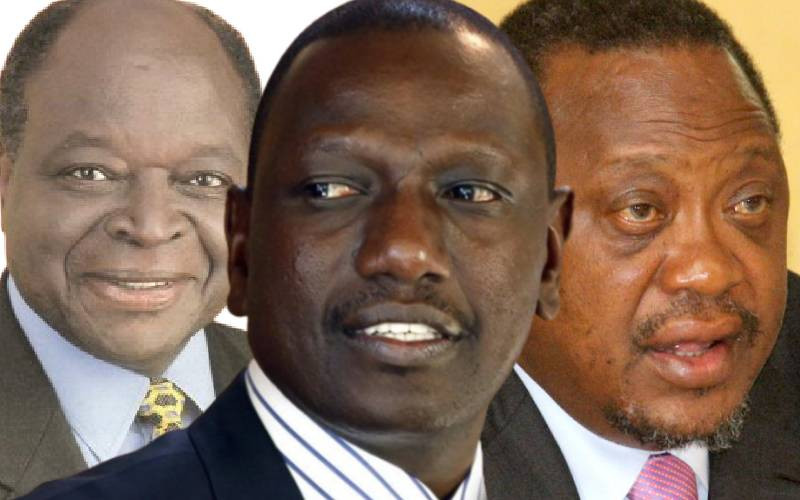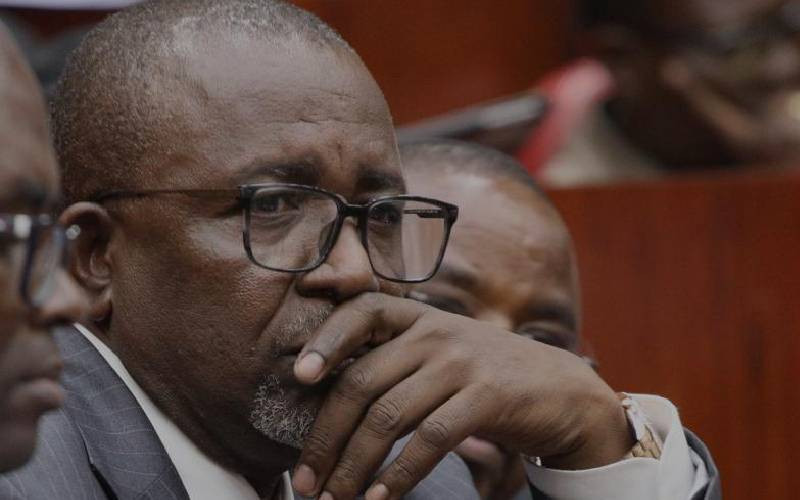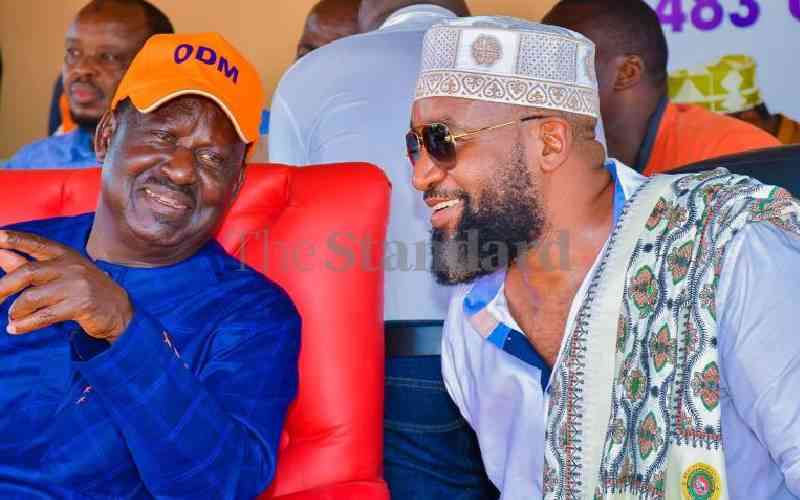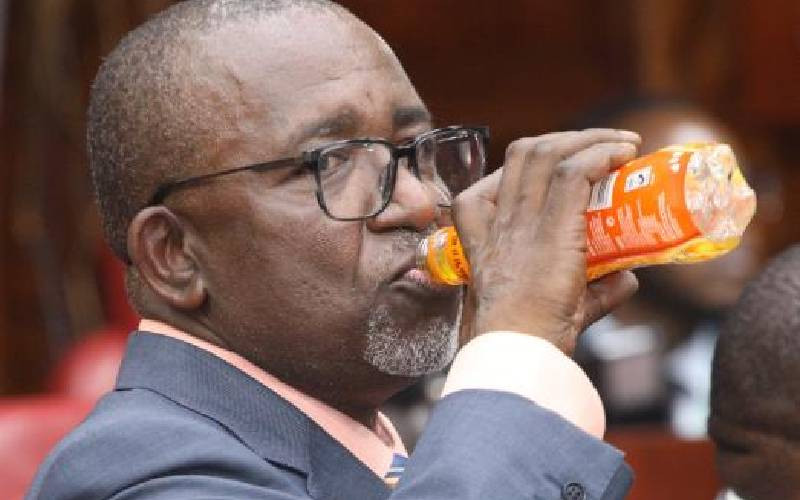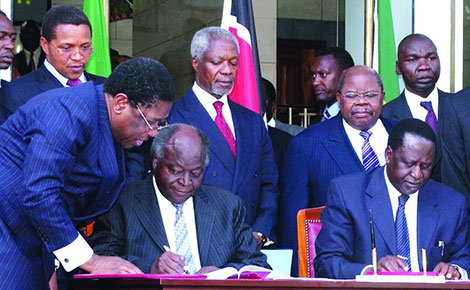 |
|
President Mwai Kibaki and ODM leader Raila Odinga sign a peace accord in the presence of chief mediator Kofi Annan and other leaders in Harambee House, Nairobi, in 2008 after post-election violence. |
A political confidant of former President Mwai Kibaki says the retired Head of State should have mended fences with former Prime Minister Raila Odinga in the early years of the National Rainbow Coalition (Narc) government.
Joseph Barrage Wanjui was Kibaki's closest adviser and once said on television that Kenya was better off with the former PM in the Opposition. He now suggests in his new book that keeping Raila in Narc would have ensured its stability and reshaped Kenya's politics.
Kibaki and Raila fell out after the former President trashed a pre-election pact he had with the ODM leader. Wanjui details in his book how in 2003, factions in Narc tried but failed to mend the rift between the President and his then Roads minister Raila Odinga.
Wanjui reveals that many meetings were held in Nairobi to try and patch up the differences between Kibaki and Raila and prevent the coalition from breaking up.
The Justice minister at the time, Kiraitu Murungi, now Meru Senator, led one faction while Raila led the other to the talks, says Wanjui in his book, The Native Son: Experiences of a Kenyan Entrepreneur.
Wanjui says elders were also brought in from both sides to try and re-unite the two who had fallen out over a Memorandum of Understanding that earmarked Raila for the Prime Minister's position as part of a pre-poll deal between his Rainbow Coalition and Kibaki's National Alliance Party of Kenya (NAK).
But the former University of Nairobi chancellor argues in his book that the constitutional dispensation at the time did not allow for a Prime Minister who would share power with an Executive President.
"It all boiled down to trust or rather lack of it," says the man known by the people who worked with him as a stickler for the law.
Wanjui feels that the NAK wing of the coalition should have honoured the deal to name Raila Premier, arguing that although it would have eroded the President's powers, it would also have ensured the stability of Narc.
This, he explains, would have quelled the bitter coalition fall-out that ensued between Raila and Kibaki, which was dramatised by the failure to pass a proposed new Constitution in 2005. Raila led rebel Cabinet members to campaign against the draft championed by Kibaki's team, and won.
"An unfortunate development subsequent to the post Kibaki Tosha beginning was that the victorious Narc could not hold together for long. Actually it soon broke up in acrimony, with Raila Odinga leading a disgruntled but powerful faction which, for all practical purposes, became Opposition within Government," Wanjui writes.
President Kibaki subsequently fired Raila and his group. That parting of ways set the stage for a political duel that would push Kenya almost to the brink.
Raila would later be named Prime Minister in 2008 to end a political standoff with President Kibaki following the disputed 2007 presidential vote that triggered violence in which more than 1,200 Kenyans were killed.
Wanjui in his book comes clean that Raila played a crucial role in Narc and Kibaki's 2003 victory against the current President Uhuru Kenyatta who was then running for high office on a Kanu ticket.
"I personally can vouch for the fact that Raila Odinga was the most energetic campaigner for Kibaki in the 2002 election campaign," he writes, adding that Raila's presence would have strengthened Narc and Kenya's politics would have matured.
Stay informed. Subscribe to our newsletter
He notes that economic growth largely depends on the decisions of leaders, saying he has always held that there should be a political leadership that guarantees individual freedoms and gives space in which business can flourish.
Wanjui admits that he loves playing the back card of an adviser, mostly ensuring that there are vast and rich opportunities for business.
The book is largely crafted as a celebration of the spirit of free enterprise; an insight into the policies and philosophies that drive business, trade and industry, and enterprise in local and global economies, but it also inevitably captures some of the country's most critical administrative moments.
Wanjui has seen all four Kenyan presidents since independence, but he candidly narrates his perceived influence during Kibaki's two terms from 2003 to 2013. He lauds efforts by his friend to bring change to the face of Kenya, saying Kibaki's legacy looks secure with respect to infrastructure development. Kibaki's performance, he notes, was truly outstanding.
The author also expresses his and Kibaki's feeling of betrayal after the former PS for Governance and Ethics, John Githongo recorded private conversations with administration officials regarding the Anglo-Leasing scandal.
He criticises the former PS for the way he conducted himself during the Anglo-Leasing saga.
 The Standard Group Plc is a
multi-media organization with investments in media platforms spanning newspaper
print operations, television, radio broadcasting, digital and online services. The
Standard Group is recognized as a leading multi-media house in Kenya with a key
influence in matters of national and international interest.
The Standard Group Plc is a
multi-media organization with investments in media platforms spanning newspaper
print operations, television, radio broadcasting, digital and online services. The
Standard Group is recognized as a leading multi-media house in Kenya with a key
influence in matters of national and international interest.
 The Standard Group Plc is a
multi-media organization with investments in media platforms spanning newspaper
print operations, television, radio broadcasting, digital and online services. The
Standard Group is recognized as a leading multi-media house in Kenya with a key
influence in matters of national and international interest.
The Standard Group Plc is a
multi-media organization with investments in media platforms spanning newspaper
print operations, television, radio broadcasting, digital and online services. The
Standard Group is recognized as a leading multi-media house in Kenya with a key
influence in matters of national and international interest.


